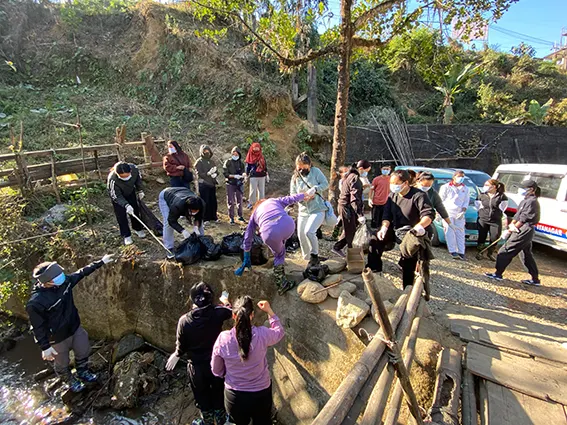[ Apasi Linggi and Kara Gambo ]
ITANAGAR, 4 Jan: In a concerted effort to restore the Yagamso river, the capital police joined hands with the Youth Mission for Clean River (YMCR), in collaboration with the Abralow Memorial Multipurpose Society, and organised a major cleanup drive on Saturday under the ‘Police Ajin’ initiative.
The drive saw active participation from YMCR members, police personnel and some volunteers, who were equipped with gloves, boots, masks, and bags to collect garbage.
Itanagar Superintendent of Police Rohit Rajbir Singh highlighted the significance of the Police Ajin initiative, which was launched last year. “The idea behind Police Ajin is to project an image of the police as an elder brother – someone the community can rely on for more than just law enforcement. While law and order and criminal investigations are our core responsibilities, this initiative aims to support society wherever it needs us,” Singh said.
He said that the collaboration with the YMCR was part of the police’s commitment to the capital’s residents. “Starting the year with this cleanup symbolises our commitment to the people of Itanagar. Beyond our regular duties, we want to contribute to the community’s needs, whether through environmental initiatives like this or other support. Sustainability is key, and we’re committed to assisting regularly, weekly or whenever possible. But it has to be a community-led initiative,” Singh added.
Singh also called upon residents living near the river, both upstream and downstream, to take responsibility for maintaining cleanliness. He stressed that proper disposal of garbage in designated areas is crucial, given that the Yagamso river is the only freshwater source in the capital. “The cleanliness of this river is a must. Residents must ensure they don’t pollute it -it’s a shared responsibility,” he said.
YMCR chairman SD Loda echoed similar sentiments, calling for a change in mindset regarding waste disposal. Loda stressed that pollution is not only a health hazard but also a moral and legal issue. He pointed out the need for individuals to carry their waste to proper disposal areas, rather than littering public spaces, particularly water bodies like the Yagamso river.
The cleanup drive revealed the predominant types of waste in the river: plastic wrappers from chips and Maggi noodle packets, mineral water bottles, and other fast food-related trash. Loda said that “this reflects both the community’s unhealthy consumption habits and a lack of environmental responsibility.”
He also urged the government and local authorities to step in and monitor pollution levels more rigorously, recommending regular audits of waste composition, including biomedical waste, to identify and address potential risks.
The collaborative effort served as a reminder of the importance of collective action. While organisations like the YMCR and the police are committed to taking the lead, they emphasised that lasting change will only come when individuals, particularly those living near the river, adopt more responsible habits.
A total of 12,960 kgs of waste were produced from the Yagamso stream at C 2 Sector, Itanagar.


